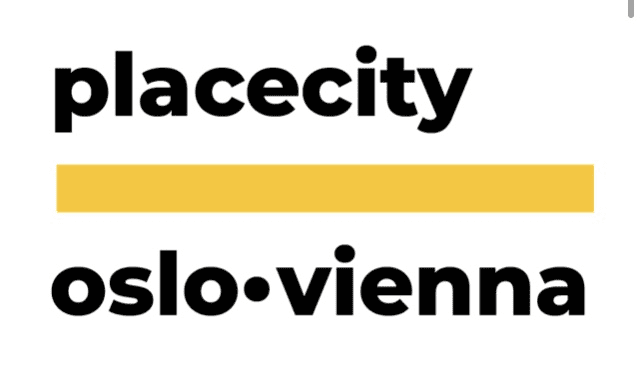FLOWERS & CHOCOLATE MAKE YOU HAPPY
World Mental Health Day
Date: 11/10/2018. Venue: G C Platoo, Koekelberg Time 19:00-22:00
Since 1990, the first full week of October has been dedicated to increasing awareness around mental health. This year, mental health awareness week was held from 7th-13th October 2018, with October 10th being mental health day.
According to the World Health Organisation, 1 in 4 of us will face mental health challenges at some point in our lives. And yet, as recently as last week, 28 global experts brought together by the Lancet medical journal decried a collective failure to respond to what they term “a global health crisis” brought on by the lack of attention to mental health. This in turn is expected to cost the world economy 14 trillion euros by 2030 on account of lost productivity. Brussels is no exception to this trend, with mental illness being the primary cause of disability in the region. With the belief that change starts in our communities, BIDS Belgium held an event for the project Espace Kalm to observe mental health day and accordingly explore how we can co-nurture a culture of care in our communities. In other words, how can we deal with mental health as a civil society?
The event included wellness professionals, designers, urbanists, social entrepreneurs as well as engaged citizens. While each of the attendees had their own moving stories to tell, two main themes emerged during the discussion: the importance 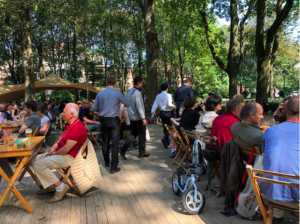 of social connections and the need for more places and projects in the city to foster those connections.
of social connections and the need for more places and projects in the city to foster those connections.
More specifically, Ariane De Vriendt, placemaker and founder of Carrousel Eliza, talked about the conversion of an existing park pavilion into a multi-functional community swing/picnic/play/cinema area at Park Elisabeth in Koekelberg. Situated next to a popular Summer pop-up community cafe Bar Eliza, this small yet impactful project affirmed that the motivation for this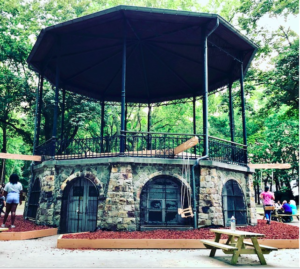 project was the need to foster inclusivity for the diverse international residents and counter loneliness. The Carrousel project was Ariane and her partner Koen Depaepe’s way of creating a meeting place that encourages play and makes people, especially strangers, more amenable to talking to one another. The project was funded by the ‘VGC diets stedelijk beleid’ which is the Flemish Government’s community centre urban policy division. Supported by the Brussels Environment agency, resulting in a public administration-civic partnership. Ariane’s point was seconded by Jean Goessens, an active pensioner in the community, who lamented that Belgians seem to have forgotten how to gather in public spaces. He insisted that isolation is not the answer and that unless we speak to one another, we will never be able to understand or relate to people who are supposedly viewed as being “different” from us.
project was the need to foster inclusivity for the diverse international residents and counter loneliness. The Carrousel project was Ariane and her partner Koen Depaepe’s way of creating a meeting place that encourages play and makes people, especially strangers, more amenable to talking to one another. The project was funded by the ‘VGC diets stedelijk beleid’ which is the Flemish Government’s community centre urban policy division. Supported by the Brussels Environment agency, resulting in a public administration-civic partnership. Ariane’s point was seconded by Jean Goessens, an active pensioner in the community, who lamented that Belgians seem to have forgotten how to gather in public spaces. He insisted that isolation is not the answer and that unless we speak to one another, we will never be able to understand or relate to people who are supposedly viewed as being “different” from us.
Jean’s view of coming together in public places resonated with others around the room who concurred that, as social animals, we need to connect with others be it in a room, a building, or in a public place. The group acknowledged that during their or their loved ones’ struggles with anxiety, stress, or other related mental health challenges, talking to someone was often the best remedy. Yoga, sports, and music were a close second. The attendees also unanimously agreed that the more we talk –openly – about mental health challenges, the less we stigmatise those challenges, and, by extension, those who experience them.
Physiotherapist and active citizen Dominique Barrat spoke about reclaiming public space and gathering community residents who are interested in community gardens and allotments with Compost Simonis. Formerly an unused space near 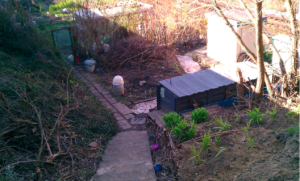 the busy hub underground station of Simonis, Dominique’s project started over 8 years ago and has since led to the public administration’s ‘approval’ for this citizen-led initiative. This is keeping with current research and programmes that recognise the link between well-being and immersion in nature.
the busy hub underground station of Simonis, Dominique’s project started over 8 years ago and has since led to the public administration’s ‘approval’ for this citizen-led initiative. This is keeping with current research and programmes that recognise the link between well-being and immersion in nature.
To this end, it was suggested that Brussels needs more public places to gather in, equipped with the necessary infrastructure, such as trees, benches, play areas, etc. wherein people of all ages and ethnicities can mix together. We need to design our public spaces in a way that facilitates meaningful social interactions. In so doing, it is hoped that residents, who may previously never have crossed one another, will find common ground and build a new shared identity. Research has established that it is this “collective joy fostered in the ritualistic coming together of strangers who share a sense of collective identity that can lend to a sense of well-being”.
Several other themes related to youth and mental health, public realm and its role in mitigating mental health, systemic exclusion and mental health, etc. also emerged. The Espace Kalm project intends to tackle each of these in separate discussions over the coming weeks.
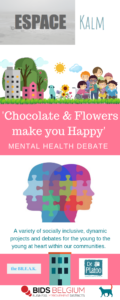
Article written by:
Namita Kambli, Urbanist & Researcher & Rozina Spinnoy, BIDs Belgium
Espace Kalm is part of the BIDs Belgium education programme Analogue to Digital where this article is also posted.
(Images BIDs Belgium and Compost Simonis)




